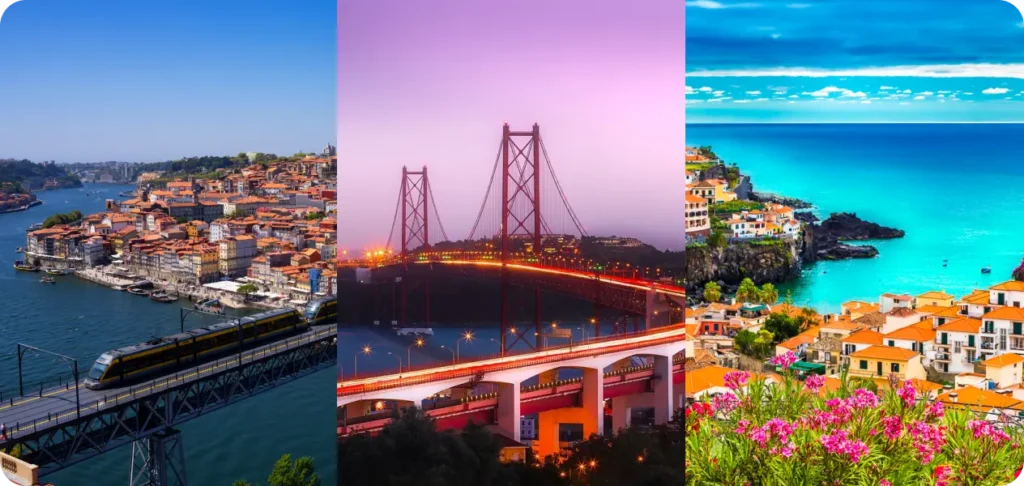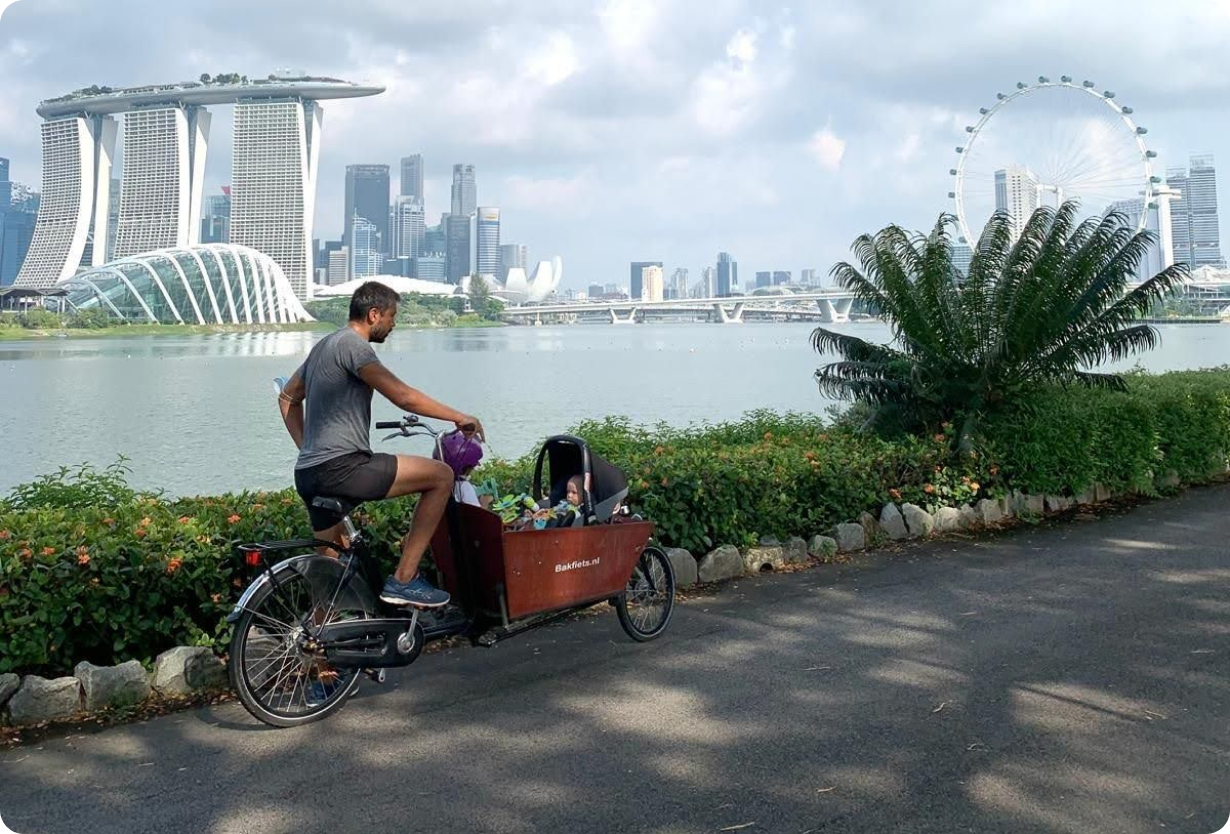
Table of Contents
- Why most people today are relocating to Portugal
- Why Portugal?
- 1. Visa Options: Finding the Right One for You
- 2. Understanding IFICI: Portugal’s New Tax Regime
- 3. Residency and Citizenship
- 4. Cost of Living: What You Really Need to Budget
- 5. NIF and Banking: Your First Week Essentials
- Getting Your NIF number in Portugal: Start Early
- What You’ll Need to Open a Bank Account
- 6. Healthcare: Public, Private, and How to Choose
- 7. Education: Schools for Children of All Ages
- 8. Neighborhoods: Where Should You Live?
- 9. Language, Culture, and Pets
- 10. Common Mistakes Newcomers Make (and How to Avoid Them)
- There’s a Way to Make All of These Easy
Last updated: 11th August, 2025
Why most people today are relocating to Portugal
Year-long sunshine. Cobblestone streets. €1 espresso. 10-min drive to the beach. Portugal has become a global magnet for remote workers, families, and founders who want more than just a change of scenery. In 2025, it’s not only one of the easiest countries in Europe to relocate to, it’s also one of the smartest.
Between tax-friendly laws, excellent healthcare, digital-nomad visa options, and a deeply welcoming culture, Portugal has positioned itself as a relocation dream
And it’s not just hype. With Portugal’s revised D8 Digital Nomad Visa, the IFICI tax regime (a new version of NHR), and a path to EU citizenship after 7-10 years of residency, it’s no wonder thousands are making the leap. Whether you’re relocating to Portugal from the U.S., U.K., Australia or beyond, this guide will walk you through everything you need to know to make Portugal your next home.
Why Portugal?
1. Quality of Life
Portugal offers a high quality of life, with good infrastructure, excellent healthcare, fresh cuisine, and a laid-back pace of living. English is widely spoken, especially in urban areas and among the younger population.
2. Warmer Climate
Enjoy almost every day with sunshine, even in winter. Counted are the days or weeks that can get cloudy. Winters are mild, while summers are hot, especially inland.
3. Safety
Portugal is one of the safest countries in the world, consistently ranking in the top 5 in global peace indices. Walking alone in the city streets is generally not a threat.
4. Cost of Living
While prices in Lisbon and Porto have gone up, Portugal is still more affordable than most Western European countries. You’ll get more value for your money in smaller towns and rural regions.
5. Digital Nomad & Expat-Friendly
The government actively encourages relocation. Programs like the D7 and Digital Nomad visas make it easier for foreigners to settle down legally.
1. Visa Options: Finding the Right One for You
D8 Digital Nomad Visa The Portugal Digital Nomad Visa is the crown jewel of Portugal’s visa offerings in 2025. It’s designed for remote workers, freelancers, and digital entrepreneurs who earn a stable income from outside Portugal. With a minimum monthly income requirement of approximately €3,480, the D8 offers a smooth and flexible path into the country for those working independently or remotely for foreign companies.
To qualify for the D8 Visa, applicants must:
- Prove consistent remote income with a few months of financial documentation (bank statements, contracts, or payslips).
- Demonstrate that their work is independent of the Portuguese economy.
- Obtain a Portuguese NIF (tax ID) before submitting the visa application.
- Provide evidence of accommodation in Portugal, whether through a long-term lease or temporary rental.
- Purchase valid international health insurance with coverage in Portugal.
Once approved, the initial D8 visa allows a stay of four months. Upon arrival, you must schedule an appointment with AIMA (formerly called SEF) to convert it into a two-year residence permit, renewable every two years. After five years, you may apply for permanent residency or Portuguese citizenship.
This visa is particularly attractive because it does not require you to start a business, hire employees, or invest capital locally. Many applicants also find that the D8 pairs perfectly with the IFICI tax regime, offering both a legal residency path and tax efficiency.
Other Visas to Consider:
- D7 Visa: Best suited for retirees or individuals living on passive income such as rental properties, dividends, pensions, or interest. It has a lower income threshold (around €870/month for the principal applicant) but requires non-employment-based earnings.
- D2 Visa: Designed for entrepreneurs and small business owners aiming to start a business in Portugal. You’ll need to submit a viable business plan and demonstrate sufficient funds to support the venture.
- Golden Visa: While Portugal has suspended real estate investment as a qualifying route, the Golden Visa remains open to applicants investing in scientific research, cultural preservation, or creating jobs. It’s an ideal route for high-net-worth individuals who prefer flexible residency with minimal stay requirements.
When choosing a visa, the key considerations include the source and type of your income, your desired level of integration, and your long-term plans (such as obtaining citizenship or relocating a business). It’s ideal to get a legal expert to evaluate your unique financial and personal background to determine the ideal immigration strategy.

2. Understanding IFICI: Portugal’s New Tax Regime
Portugal’s previous NHR (Non-Habitual Resident) tax scheme attracted thousands of foreign residents with its generous tax benefits, but it officially ended in 2023. Taking its place in 2025 is the IFICI program, short for Fiscal Incentive for Scientific Research and Innovation.
At its core, IFICI offers a flat 20% income tax rate on Portuguese-sourced income for a period of ten consecutive years. This is a substantial discount compared to Portugal’s standard progressive tax brackets, which can go as high as 48%. If you’re working locally in a high-value profession, this incentive can amount to major tax savings over the long term.
In addition, foreign-sourced income, such as remote salaries, dividends, capital gains (including cryptocurrency), interest, and royalties, may be fully exempt from Portuguese taxation, provided they are not derived from Portuguese sources or used to fund a Portuguese-based entity. For remote workers and digital nomads who maintain contracts or businesses abroad, this is a game-changing feature.
To qualify, you must:
- Become a tax resident in Portugal, meaning you must either spend more than 183 days per year in the country or maintain a habitual residence there.
- Be employed by a Portuguese company or self-employed in a field classified as a “high-value activity,” such as information technology, financial services, scientific research, engineering, healthcare, or the arts. The Portuguese tax authority publishes an annually updated list of eligible professions.
- Apply for and register under IFICI during your first year of tax residency, as failure to register early may disqualify you.
Unlike its predecessor, IFICI also introduces additional criteria to ensure applicants are actively contributing to Portugal’s economy, science, or innovation sectors.
IFICI also allows you to plan your global income streams more strategically. For example, you may choose to route freelance or contract payments through an offshore structure, manage dividends through a tax treaty jurisdiction, or time your capital gains to fall outside Portuguese tax obligations.
Beyond the surface, many newcomers fail to realize that IFICI also impacts social security obligations. In some cases, remote workers may be exempt from paying into the Portuguese social security system for the first 12 months, depending on double-taxation treaties and the setup of their employment. These details can significantly affect your net income and should be evaluated carefully.

Thinking of relocating to Portugal?
A free call with our relocation expert will give you a clear path forward – no stress, just answers.
3. Residency and Citizenship
Once your visa is approved, you can then apply for residency.
In 2025, Portugal has tightened its rules for acquiring citizenship by naturalization. Citizenship eligibility will now require ten years of legal residency, or seven years if you’re from a Portuguese-speaking country, with the clock starting only after your residence permit is issued, not when you applied.
In addition to language proficiency (typically A2 level), you will need to pass a civic and cultural exam, demonstrate a clean criminal record, and prove genuine integration into Portuguese life.
Children born in Portugal to foreign parents are no longer granted Portuguese nationality automatically. Instead, at least one parent must have legally resided in the country for a minimum of three years, and the child’s citizenship must be formally requested through an application process.
These measures are intended to foster deeper connection and integration, though as of now, they remain subject to parliamentary approval.

4. Cost of Living: What You Really Need to Budget
Portugal is not as cheap as it once was, but it’s still incredibly affordable by Western standards. Here are average monthly costs for a single person in 2025:
- Lisbon 1-bed rental: €1,100–€1,900
- Groceries: €250–€400
- Utilities and internet: €120–€150
- Private health insurance: €40–€140
- Transport pass: €40–€50
Secondary cities like Porto, Braga, and Coimbra offer 20-40% less on these rates, with fewer tourists and more community.
It’s also worth factoring in lifestyle costs such as dining out, gym memberships, and leisure activities. In Portugal, a dinner at a mid-range restaurant rarely exceeds €30 per person, and local wine is often less than €15 a bottle. A gym membership in urban areas ranges from €50 to €100 per month, and many towns have public sports facilities that are free or heavily subsidized.
Transportation is another area where Portugal shines. Public transport networks in cities like Lisbon and Porto are extensive, reliable, and affordable. With a monthly pass averaging around €45, you’ll have access to metros, buses, trams, and even some regional trains.
When it comes to utilities, Portugal offers low average usage costs, especially if you live in an energy-efficient apartment. However, heating can be a surprise expense in the winter months, particularly in older homes without central heating. Consider allocating an extra €80–€140/month during the colder season if living in the north or in poorly insulated housing.
Finally, internet and mobile service in Portugal is fast, widely available, and competitively priced. Fiber internet with unlimited data averages around €30/month. Mobile plans with generous data can be found for as little as €15/month.
5. NIF and Banking: Your First Week Essentials
Before you can legally rent a property, sign up for utilities, or open a bank account in Portugal, you’ll need a Número de Identificação Fiscal (NIF) – also known as your Portuguese tax identification number. It is the golden key to unlocking nearly all bureaucratic processes in the country.
Getting Your NIF number in Portugal: Start Early
You can apply for a NIF number in person at any Portuguese Finanças office (tax authority), or online via a third-party legal or relocation service before you even land. Getting it remotely is often more convenient and faster, especially if you’re on a tight schedule during your first few weeks.
What you need to get a NIF:
- Valid passport
- Proof of address (your current foreign address is usually fine if you’re applying from abroad)
- A fiscal representative (required if you’re not an EU/EEA citizen)
- Optional but helpful: Proof of income or employment
How to get it remotely:
Several agencies offer NIF services for a fee, usually between €80 to as high as €500. They handle the paperwork and act as your temporary fiscal representative. Zerra gets your NIF application done for you as a part of your relocation support.
Once issued, your NIF will be emailed as a PDF, and it’s ready to use for everything from opening bank accounts to getting a SIM card.
Popular banks for expats and newcomers:
- Millennium BCP: Offers English-speaking service and good digital tools.
- Novobanco: Widely available across the country with a straightforward setup process.
- ActivoBank: Digital-first bank with lower fees and an easy-to-use mobile app.
- Caixa Geral de Depósitos (CGD): Portugal’s largest public bank, with extensive branch coverage.
- Revolut or N26: Online alternatives. While not Portuguese banks, they are often accepted and can be useful while waiting to open a local account.
What You’ll Need to Open a Bank Account
Requirements may vary slightly by bank, but typically you’ll need:
- Valid passport or EU national ID
- NIF number
- Proof of address in Portugal (this can be a lease contract, Airbnb booking, or hotel confirmation)
- Proof of income (such as employment contract, remote work letter, or pension statement)
- Portuguese mobile number (sometimes needed to activate online banking)
Tip: Some banks accept Airbnb bookings as a temporary address if you don’t yet have a long-term lease. Always confirm in advance.
6. Healthcare: Public, Private, and How to Choose
Portugal has a robust public healthcare system (SNS), and you’ll gain access once you register your residency. But many expats opt for private insurance for faster service and English-speaking doctors.
- Public Healthcare (SNS) is available to residents and is affordable.
- Non-EU citizens with visas can access it after registering.
- Private healthcare is high-quality and faster; many expats choose to get private insurance.
- Major cities have English-speaking doctors and clinics.
Monthly premiums for expat health insurance start at €40/month.
7. Education: Schools for Children of All Ages
Portugal offers:
- Public schools, taught in Portuguese
- International schools, teaching UK, US, IB, or German curricula
- Private Portuguese schools, more affordable and bilingual
Lisbon, Cascais, and Porto have excellent international options. Fees range from €6,000 to €20,000/year.

8. Neighborhoods: Where Should You Live?
Choosing the right place to live in Portugal is one of the most personal and strategic decisions you’ll make. Each region offers its own lifestyle, community feel, and cost of living. Here’s a breakdown of the most popular areas for expats in 2025:
Lisbon Lisbon is Portugal’s capital and its cultural, economic, and tech epicenter. It’s a cosmopolitan city with historic charm and a modern edge, offering a vibrant lifestyle that’s particularly appealing to young professionals and digital nomads.
- Diverse neighborhoods, each with a unique vibe
- Top areas: Príncipe Real (upscale and trendy), Estrela (quiet and family-friendly), Alfama (historic with panoramic views)
- Excellent public transport, international schools, co-working spaces, and nightlife
- Higher cost of living but unmatched access to events, amenities, and opportunities
Porto Located in the north, Porto is a more laid-back and affordable alternative to Lisbon. Known for its creative energy and artisanal traditions, it’s increasingly popular among artists, entrepreneurs, and remote workers who want quality of life without big-city costs.
- More affordable housing and less crowded than Lisbon
- Key neighborhoods: Foz do Douro (beachfront and upscale), Cedofeita (artsy and central)
- Strong café culture, beautiful riverfront, and excellent gastronomy
- Slightly cooler and rainier climate, but with deep cultural roots
Madeira and the Algarve For those seeking sunshine year-round, lower costs, and a slower pace of life, Madeira and the Algarve offer an unbeatable combination of climate and tranquility.
- Madeira: A lush island with a growing digital nomad community, mild temperatures year-round, and tax advantages for businesses operating in the Free Trade Zone
- Algarve: The southern coastal region popular with retirees, families, and anyone who loves beach life; towns like Lagos, Tavira, and Albufeira are particularly welcoming
- Lower housing and lifestyle costs compared to Lisbon or Porto
- Slower pace, but growing communities of remote workers and expats
Rental Tips:
- Use local sites such as Idealista, Imovirtual, and OLX.
- Expect to pay two to three months upfront.
- Apartments often come furnished for short-term rentals, and unfurnished for long-term rentals.
- Scams do exist, so never pay before visiting or signing a contract.
Each of these regions has something distinct to offer depending on your preferences. Whether you prioritize walkability, beach access, nightlife, family amenities, or proximity to international airports, Portugal delivers multiple options for a well-rounded life abroad.
9. Language, Culture, and Pets
Although many Portuguese locals speak English, especially in cities and tourist areas, learning the language will significantly enrich your day-to-day experience. It not only helps you navigate essential tasks like government paperwork and healthcare but also deepens your connection with the community. Apps like Duolingo, Memrise, and Babbel are great for beginners, and in-person language schools are widely available in big cities.
Culturally, Portugal embraces a relaxed pace of life where leisure and social time are valued. Punctuality is more fluid in informal settings, and you may notice that bureaucratic processes can take time, so patience is essential. Tipping isn’t obligatory but is always appreciated.
If you’re bringing pets, Portugal is very pet-friendly. You’ll need to ensure your pet is microchipped, vaccinated for rabies, and accompanied by an EU pet passport or a certified health certificate. Most long-term rentals allow pets, though it’s important to confirm this in advance with the landlord.
10. Common Mistakes Newcomers Make (and How to Avoid Them)
Relocating to Portugal can be a smooth and rewarding experience, but there are a few common mistakes that can complicate your transition. Being aware of these pitfalls will help you prepare more effectively and avoid unnecessary stress.
Delaying your NIF and bank account setup: Your NIF (tax number) is essential for renting a home, opening a bank account, or signing service contracts. Waiting too long to get these sorted can create delays in every other part of your relocation.
Failing to register as a tax resident on time: If you plan to benefit from IFICI tax incentives, you must declare your tax residency within the first year. Missing this window could mean losing access to the program altogether.
Rushing into overpriced or unsuitable housing: Without understanding market norms or tenant protections, many expats end up overpaying for short-term rentals or signing leases that don’t meet their needs. It’s important to research your rights and avoid hasty decisions.
Assuming English will be spoken everywhere: While English is common in urban centers, most official documents and services are in Portuguese. Preparing for a language barrier will make a significant difference in navigating bureaucracy and daily life.

There’s a Way to Make All of These Easy
If you are confused with how this information applies to your personal situation, we’re here to help. We can hop on a free 15-minute consultation call with you to address any of your questions regarding your relocation.
Zerra is helping numerous people relocate to Portugal everyday. With our support you get:
- Visa application & legal processing
- NIF + bank account setup (remote or in-country)
- Personalized tax strategy and optimization
- IFICI tax registration and planning
- Ongoing monthly accounting + annual tax filing
- Monthly legal and taxation consulting services
We manage it all so you can move with confidence, skip the bureaucracy, and start enjoying life in Portugal from day one.
Have a question in mind?
Relocating isn’t just about paperwork. It’s about building a better lifestyle. Portugal in 2025 gives you the opportunity to live well, spend smart, and unlock long-term EU benefits.
Zerra is here to handle every detail for you. Book a free consultation and let’s get your new life in Portugal started!

Thinking of relocating to Portugal?
A free call with our relocation expert will give you a clear path forward – no stress, just answers.





